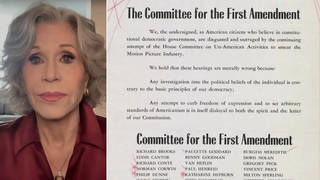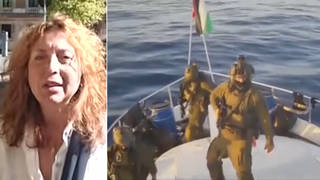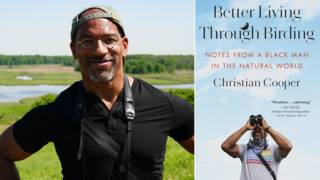
We discuss climate solutions and the need for broad involvement in the fight to avert climate catastrophe with writer and activist Rebecca Solnit and longtime Filipino climate activist Renato “Red” Constantino. Solnit is the co-editor of Not Too Late: Changing the Climate Story from Despair to Possibility, which features an essay by Constantino about his role in the Paris Climate Agreement titled “How the Ants Moved the Elephants in Paris.” “This is the decade of decision, and we need as many people as possible engaged as fully as possible,” says Solnit.
Transcript
AMY GOODMAN: This is Democracy Now!, democracynow.org, The War and Peace Report. I’m Amy Goodman.
We look now at the push to address the climate crisis, as environment ministers with the G7, the Group of Seven richest countries, just finished a meeting in Japan on the global energy crisis ahead of a G7 leaders’ summit in Hiroshima next month. This is Japan’s environment minister.
AKIHIRO NISHIMURA: [translated] Russia’s invasion of Ukraine has had a significant negative impact on the global environment and energy issues that we are working on. And the importance of cooperation among the G7, which leads the international community, is heightening again.
AMY GOODMAN: Ministers agreed to drastically expand offshore wind power by 2030 and accelerate the phase-out of fossil fuels. But they failed to set a timeline to phase out coal-fired power plants, which are seen as key to reaching critical carbon emissions goals set by the Paris climate accord. This comes as a recent study finds current commitments by countries to wind down the use of coal-fired power are likely not enough to meet key targets to stop the planet from warming 3 degrees Celsius by the end of the century, unless far more coal plants shut down in the next five years.
For more, we’re joined by two people: writer and activist Rebecca Solnit, whose latest project is a book she co-edited titled Not Too Late: Changing the Climate Story from Despair to Possibility; we’re also joined by the longtime Filipino climate activist Renato “Red” Constantino, who has an essay in the book that’s titled “How the Ants Moved the Elephants in Paris” about the role he and others played in the Paris accord. He’s deputy chair of the Expert Advisory Group of the Climate Vulnerable Forum.
We welcome you both to Democracy Now! Rebecca Solnit, let’s begin with you. What gives you hope at this dire time, when the planet is reeling from global heating? Why do you say “Not Too Late”?
REBECCA SOLNIT: A lot of people think it’s too late to do anything about the problem. A lot of people have given up or think that we’re supposed to give up because there’s nothing we can do. There’s so much we can do in this moment, and doing it matters for the next 10,000 years of life on Earth. We’re in the decade of decision. The scientists at the IPCC, the organizers, the policy people know what we need to do.
Thelma and I, when we put this book together, wanted to build, essentially, an on-ramp to activism and engagement, a recognition that we have the solutions, and to also address the emotional impact, because it is devastating and deeply wrong, but one of our sort of axioms we’ve settled on is “Despair is an emotion we respect, but it’s not an analysis.” And so we bring analysis, kind of emotional support and credible stories like Red’s of how the ants moved the elephants at Paris, and encouragement — a word that means to instill courage — for people to participate in deciding the future.
There’s a real sense, particularly in the United States, I think, that the future has already been decided. People in this country love certainty. But so much of it is what we’re doing in the present to decide it now. And so, we wanted to address the emotional side of things, and we wanted to encourage full participation, which is what will bring us the best — I’m sorry, which is what will bring us the best-case scenario and steer us away from the worst-case scenarios.
AMY GOODMAN: Well, Renato Constantino, also known as “Red,” I mean, your essay in this book, Not Too Late, to say the least, is deeply inspiring. I mean, we’ve covered so many U.N. climate summits. Beginning each year, it seems, there is another storm in the Philippines. You wrote this piece, “How the Ants Moved the Elephants in Paris,” talking about the 2015 Paris climate accord. There are projections that say we’ll be past 1.5 degrees by 2030. In your essay, “Many considered 1.5° unachievable not because of science but [because] of politics. Representatives of elite [INGOs] viewed [that] limit with disdain. Some even lobbied leaders supporting vulnerable country governments to quash efforts to advance the more ambitious climate goal, [claiming] this was in order not to harm 'global' consensus.” And yet, talk about the story of 2015 Paris Agreement and how you and other activists succeeded in setting a limit, whether or not it’s being respected.
RENATO CONSTANTINO: Thanks, first of all, for having me on this program.
And, yes, completely, it was a great — with great happiness that I accepted the invitation to contribute to this book, because we believe, very strongly, very deeply, in its title, that it’s not only not too late, but it’s also urgent that we turn the narratives and stories about the climate crisis into one of possibility, rather than the very luxury that no one can afford, especially vulnerable people: despair. No one can afford it. That’s too expensive, because you all are counseled to just lean back on lawn chairs, thinking that doom is around the corner, rather than understanding that we’re already facing various degrees of collapse, at the same time as we’re facing a resurgence again, new waves of anger and hope and celebration, that we can turn things around and that when people start working with one another, and small countries band with the other small countries, the ants really can move elephants.
And Paris, of course, was about 1.5. There are scientific projections that we may breach this threshold by 2030. But there are also a lot of scientific studies that continue to come out saying that though we might breach it, we might also be able to bring it back down, if not below, but there will be a lot of hard work ahead. But hard work, difficulty, does not mean, as the other editor, Thelma Lutunatabua, said, does not mean inevitable. It means it is possible, and we must chase it, just like in Paris. One-point-five was considered a romantic but ultimately doomed target. And the small nations and a lot of social movements just said, “This is not a game. Our boundaries are not bound by the politics of those who refuse to let go of their own economic status and lifestyles. Our politics is bound by what our conception is of survival and also our ability to thrive.”
And that will always drive an insurgency across talks, that while they may get bogged down, there are so many instances in the past that show that the status quo can be overturned and will be overturned, if we only bite down on our mouthpiece, so to speak, and fight the good fight — without any guarantee, except a guarantee that we will fight harder and stronger and smarter as we become wiser and as we grow in terms of our heft and the public’s participation.
AMY GOODMAN: And why you’re in Washington, D.C., right now, from the Philippines, dealing with the IMF, the International Monetary Fund?
RENATO CONSTANTINO: The IMF is a critical institution. The Bretton Woods Institutions need to play a far more relevant role, because they were set up, ostensibly, to manage a global crisis, and they have neglected climate change for so long and still think that the solutions that we need today are reforms that might actually perpetuate the same order. However, things are really changing rapidly, because they see that proposals from the past will not work, simply because it’s a reinvention of tools and measures that have brought us to this crisis in the first place. They’re confronting the fact that the world economy needs to transform rapidly, but also that the big countries, especially the rich countries, need to play fair, stop cheating, and to start taking action in a far greater way, even as their responsibility lies beyond simple domestic emissions reductions. They also need to play a bigger role in terms of allowing vulnerable countries to transition faster and achieve prosperity. Survival is not enough. We need to do more than survive. We need to thrive, as well.
And the IMF certainly has a role to play here in terms of ensuring debt relief and in terms of ensuring that there’s a universal surveillance of the transition risks and physical climate risks that every economy is facing today, in order to trigger a revaluation of assets, from fossil fuels to infrastructure to investment strategies that build resilience. The entire economics and the entire way of measuring development will have to be changed in a comprehensive way. But we cannot wait for anything perfect, so we have to keep moving the inches, knowing that when we do the inches, leaps in terms of miles become possible, as well.
AMY GOODMAN: Rebecca Solnit, you say climate deniers are not really the main problem. And, of course, it seems like there are many more in the United States than in other places. So, talk about what is the problem and a framework for change.
REBECCA SOLNIT: The good news is that there’s been a lot of surveys recently that show that globally and nationally in the U.S., the majority of people take climate change very seriously. They want to see action. They want to see investment, etc. And the problem we face isn’t really an environmental problem. It’s not a problem of physics. We have the solutions. It’s a political problem. We need civil society, the climate movement to become more powerful than the vested interests, the stagnation of the status quo, to push for the swift transition, that is not impossible but will be difficult, will require kind of radical shift in our priorities, huge investment on profound transformation, ultimately for the better.
And so, it’s really about — not about the minority of climate deniers. You know, people in this country often think that we need to be evangelists and convert our enemies. But what we really need to do is rally our friends. If we can get enough participation — and we learned this from history, from the civil rights movement, from the women’s suffrage movement, etc. We need the critical momentum to overcome those vested interests, that stagnation, that incomprehension by the gerontocracy that runs this country, and to do what needs to be done.
And so, as Thelma and I keep saying, difficult is not impossible. We put this together partly because we’re nice ladies and we don’t want people to feel worse than they should about the situation, but also really as a kind of enlistment manual and a toolkit to send people into action, to understand what we can do, how to do it, respect and admire the people doing it already, so many of whom are in this book as extraordinary voices, and to do this thing, because, as I said before, this is the decade of decision, and we need as many people as possible engaged as fully as possible constructively.
AMY GOODMAN: When you look at something like Biden signing off on the Willow project in northern Alaska and yet also pushing solar and wind and being seen as a major climate change president, how do you reconcile these two?
REBECCA SOLNIT: And there’s two things worth saying about that. One is that it sort of feels like Obama is all of the above, and I always feel like it’s like talking to somebody saying, “I’m drinking strychnine, but I’m also carrot juice.” And the carrot juice is not going to undo the strychnine. You have to, you know, stop drinking the poison. You have to stop the fossil fuel expansion. We already have more fossil fuel sites being exploited than the climate can tolerate.
But the other thing about it, last night I was with Antonia Juhasz, who I know has been on this show often, a brilliant oil policy analyst, a contributor to this book and a longtime friend of mine. And she’s saying, despite Willow, the fossil fuel industry is essentially in decline. It’s weak. It’s fragile in many ways. We can defeat it. But again, we have to be more powerful than the status quo and the vested interests. And that’s entirely possible, but it does require profound engagement, expansion of what has been a growing climate movement, growing in intersectionality, growing in strategy, growing in intelligence about what the pressure points are.
And so, you know, I know Earthjustice and other organizations have filed lawsuits against Willow. It’s not guaranteed to happen. But we also need administrations that don’t even try to do that, to say, “Yeah, this was in the pipeline. Yeah, the permits were in place. But we’re going to do a 180 and cancel things like that.” We need to be on an emergency footing rather than business as usual. I think they approved it because it was a sort of business-as-usual thing, and they didn’t feel the pressure to disrupt it. We need to be that pressure to disrupt.
AMY GOODMAN: Finally, we just have 30 seconds, but what do you hope to accomplish with this book that you co-edited?
REBECCA SOLNIT: I want to give everyone, including newcomers and young people, encouragement to look at the possibilities, to know that there’s a lot we can do, to know that the future is not yet written — we’re writing it with what we do or fail to do in the present — and to do everything they can.
AMY GOODMAN: Rebecca Solnit, we want to thank you for being with us, co-editor, with Thelma Young Lutunatabua, of the new book, Not Too Late: Changing the Climate Story from Despair to Possibility. Also thank you to Renato “Red” Constantino, longtime Filipino climate activist, who has an essay featured in the book.
That does it for our show. Democracy Now! is currently accepting applications for a digital fellow. Check out democracynow.org. I’m Amy Goodman. Thanks so much for joining us.












Media Options